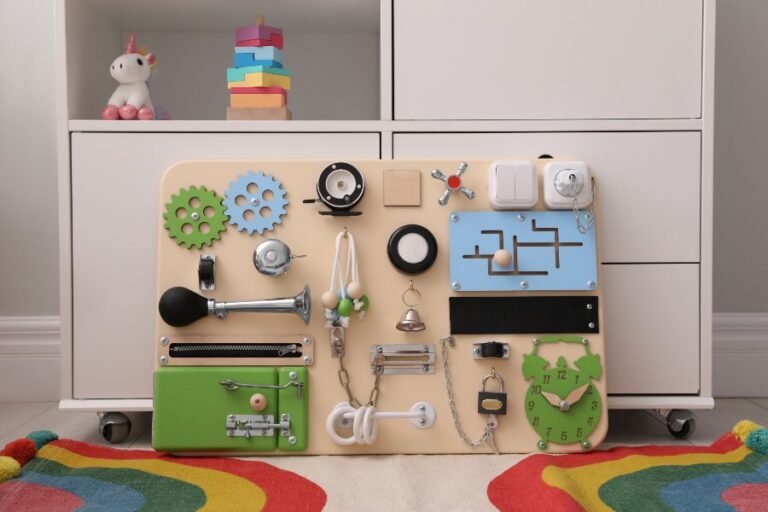Bonding Beyond Birth: Strengthening the Parent-Child Connection Through Bonding Activities
Strengthening your parent-child bond beyond birth involves more than just physical presence. Engaging in shared hobbies, establishing routines for quality time, and practicing active listening can deepen your connection. Bonding is key to your child's emotional and biological development, impacting their happiness, wellbeing, and future relationships. Recognizing your child's unique communication cues can make you a more confident caregiver, while nurturing emotional intelligence fosters empathy and emotional regulation. But don't worry, bonding isn't an exact science – it's a loving, enjoyable journey where discovering more strategies can keep you and your child growing closer.
Main Points
- Engage in shared hobbies or interests to foster a stronger parent-child bond and mutual understanding.
- Develop regular routines for quality time, which can build trust and closeness beyond birth.
- Practice active listening to show genuine interest in your child's thoughts, which deepens the connection.
- Sharing personal stories and experiences can create shared memories, further strengthening the bond.
- Participate in physical activities or play to promote bonding through enjoyment and shared laughter.
Importance of Parent-Child Bonding
Understanding the significance of parent-child bonding is essential as it lays the foundation for your child's emotional and biological development, starting as early as infancy with simple skin-to-skin contact. This bonding is the cornerstone of the strong bonds that lead to happier, well-adjusted children. When these bonds are weak, it can result in anxiety and detachment in adulthood.
As you aim to build strong connections with your child during early childhood, remember that this bonding isn't just about affection. It's about enhancing their social skills, communication, and a sense of belonging and identity. You're helping to prepare them for positive long-term outcomes. This is why it's crucial to prioritize parent-child bonding.
Father-child bonding, in particular, plays an important role in a child's cognitive development, well-being, and emotional regulation. This might seem challenging, but every moment spent with your child contributes to this bond. So, take heart, knowing that every hug, every bedtime story, and every shared laugh is helping your child develop emotionally and biologically. In this journey of parenthood, remember that these precious moments of bonding are building a stronger, happier future for your child.
Recognizing Bonding Difficulties
How can you tell if you're having difficulties bonding with your child? This may manifest through emotional struggles in your child, such as frequent tantrums, withdrawal, or attachment issues like clinging or rejection. It's important to understand that these signs often reflect the child's response to parental stress or your mental health issues, and are not a reflection of their character or your parental abilities.
Your past trauma can also affect your ability to bond with your child. You may find yourself avoiding physical contact or feeling disinterested in interaction, which can further strain the relationship. Being aware of these signs is the first step in addressing bonding difficulties.
Bonding Strategies for Fathers
While dealing with bonding difficulties can be challenging, it's especially rewarding to explore the unique ways fathers can strengthen their relationship with their children. Father-child bonding is an essential element in your child's life that shapes cognitive development and emotional resilience. Your involvement as a father from birth and beyond equips your child with the tools to navigate life's challenges.
Your play style plays a pivotal role in your child's development. Unlike mothers who often focus on nurturing, fathers tend to engage in more physical and challenging play. This risk-taking approach helps your child learn emotional regulation and resilience. It encourages them to step out of their comfort zone, fostering self-confidence and independence.
Your active participation as a father contributes to positive child outcomes. When you engage in physical play, it not only strengthens your bond but also helps your child learn to manage their emotions. This unique connection you establish with your child has far-reaching effects, from building strong emotional ties to enhancing your child's overall wellbeing. Remember, your role as a father extends beyond provision; it involves nurturing a bond that's built on love, faith, and mutual respect.
Top 10 Baby Bonding Activities
Let's explore the top 10 baby bonding activities, which include comforting skin-to-skin contact, lovingly feeding your baby, engaging in interactive interactions, calming baby massages, and engaging reading sessions together.
Skin-to-skin contact isn't just vital for your baby, it also builds a sturdy foundation for your parent-child relationship. This intimate connection fosters a profound sense of security in your baby, reinforcing the bond between you two. Feeding is another essential bonding activity. Approach it with love and patience, allowing room for eye contact and gentle communication. This isn't simply about nourishment, it's a chance to deepen your bond.
Interactive playtime is also important. It's not just about fun, it's an opportunity for your baby to learn, communicate and understand better. Baby massage, on the other hand, not only promotes relaxation and better sleep but also strengthens your bond. Lastly, never underestimate the power of reading together. It's an engaging activity that fosters bonding while stimulating your baby's developing senses.
Understanding Your Babys Signs
Building on the importance of bonding activities, understanding your baby's signs is equally crucial in forging a stronger parent-child relationship. Your baby communicates with you through crying, eye contact, body movements, and facial expressions. These baby cues are their way of expressing their needs and emotional state.
Being able to recognize these signals can be a game-changer. You'll be able to respond appropriately, whether it's feeding time, nap time, or simply a need for comfort. This comprehension of your baby's needs not only eases their discomfort but also contributes immensely to the parent-child bond.
It's not always easy, and you might not get it right every time. That's perfectly okay. The key is to be patient, observant, and responsive. Over time, you'll learn to interpret your baby's unique language. This understanding will strengthen your connection, making you a more confident caregiver.
Fostering Long-Term Emotional Health
Creating a lasting emotional health for your child starts with you. It's about nurturing emotional intelligence, improving communication techniques, and establishing resilience from an early age. These factors can positively shape their emotional well-being into adulthood.
Establishing Emotional Resilience Early
In the journey of parenting, fostering emotional resilience in your child early on can have a substantial impact on their long-term emotional health, equipping them to deal effectively with stress and life's challenges. Bonding activities play a pivotal role in establishing this resilience, enhancing the parent-child connection and promoting healthy childhood development. Through these shared experiences, you're not just creating lasting memories, but also laying the foundation for their emotional stability in adulthood. These activities have the potential to foster adaptability and positive mental health, contributing greatly to your child's overall well-being and happiness. Remember, the earlier you start, the more profound the impact. So, embrace this journey, strengthen your bond and nurture your child's emotional resilience.
Parent-Child Communication Techniques
Exploring the realm of parent-child communication, it's essential to establish open channels that build confidence and foster emotional well-being. Active listening techniques show you value your baby's feelings, helping your baby develop emotionally and psychologically. Sharing stories and experiences can strengthen your bond with your baby. Effective non-verbal cues, a key component of emotional communication, can enhance understanding. Encourage dialogue without judgment, creating a safe space for emotional expression. This child bonding approach fosters a deeper connection, promoting long-term emotional health. Each interaction is an opportunity to strengthen the bond and build faith. Remember, your baby's emotional health is as important as their physical health, and your role in their emotional development is paramount.
Nurturing Emotional Intelligence
Building on your child's emotional intelligence is a powerful way to foster their long-term emotional health, leading to enhanced self-awareness and improved social relationships. As parents, nurturing this in your children equips them with empathy, resilience, and effective communication skills.
Here are three practical ways to nurture their emotional intelligence:
- Validate their feelings: Acknowledging and respecting their emotions helps children understand and manage them better.
- Teach emotional regulation: Guide them in identifying emotions and using healthy strategies to handle them.
- Model empathy: Show them how to be sensitive to others' feelings, teaching them empathy by example.




